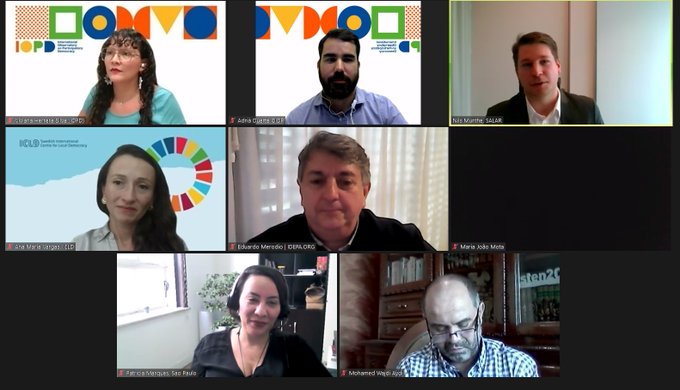On 15 September 2023, for the International Day of Democracy, the IOPD organised the webinar Local and regional governments facing the rise of distrust, polarisation and extremism.

On the occasion of the International Day of Democracy, the OIDP, with the support of United Cities and Local Governments and the City of Rio de Janeiro, organised the webinar "Local and regional governments facing the rise of distrust, polarisation and extremism." This virtual session brought together six local and regional leaders and experts to explore their municipal experiences in the current challenging context for democracy, but above all, to shed light on possible solutions to reverse this crisis from local and regional governments with an international perspective.
Viviana Herrera, IOPD Officer, opened the virtual session to recall that this is the last in a series of three webinars towards the 22nd IOPD Conference "Participatory Democracy for Diverse, Inclusive and Transparent Cities", to be held in Rio de Janeiro from 6-8 November 2023.
Then, Adrià Duarte, Coordinator of the IOPD, introduced the event by recalling that local and regional governments are a fundamental pillar of democracy, due to their proximity to citizens. He also took the opportunity to recall that the International Day of Democracy is the occasion to celebrate and reclaim democracy as a political system that defends people's rights and allows the construction of cities and societies under the principles of the common good. This virtual debate was even more relevant in the framework of the SDG Summit currently taking place in New York, as it was aligned with the objective of providing high-level political guidance for transformative and accelerated action to advance towards the 2030 Agenda, specifically for SDG 16 "Peace, justice and strong institutions."
Rodrigo Corrêa, Secretary for Public Integrity, Transparency and Data Protection of the Rio de Janeiro City Municipality, contributed to the setting from his municipal experience, by bringing to the forefront that misinformation is one of the greatest challenges faced by contemporary democracies. To face it, it is necessary to strengthen collaboration between local and regional governments, civil society, democratic institutions and digital platforms.
This was followed by a warm-up discussion through Mentimeter, in which participants shared that for them, democracy is about participation, equality, inclusion, freedom and social justice. Regarding the challenges of democracy, the participants agreed that the most challenging group to include in participatory processes is young people, followed by migrants and older people. To begin to address these challenges, the participants agreed that local and regional governments can implement awareness-raising and citizen education activities, promote participatory and deliberative practices, and champion open and transparent government.
Jose Manuel Ribeiro, Mayor of Valongo, opened the contributions section by sharing his experience as a local leader. For Ribeiro, democracy goes beyond organising elections, but rather the constant progress of dialogue and debate, in which plurality and human rights are respected, for without this, there can be no democracy. He added that from the local level it is about investing in a citizenry that can understand the world and the values to change it, since ignorance is good for populism. For Mayor Ribeiro, it is very important that all local programmes are linked to action at the superstructure level: any local action must consider the macro level.
Ana Maria Vargas, PhD and Research Director in the Knowledge Centre of the Swedish International Centre for Local Democracy (ICLD) offered possible solutions to face challenging times, which starts with increasing local government action, involving youth and pushing work from communities to international networks.
Wajdi Aydi, former Sfax Deputy Mayor, expert in Local Governance and coordinator of the Association Afrique Intelligence, shared his experience as a local leader and expert in a challenging context such as that of Tunisia and Africa, intertwined with crises of poverty, dictatorships and lack of citizen participation. As a solution to this scenario, Aydi put at the forefront the action of local governments in collaboration with civil society and associations, reinforced by networking, in which the IOPD and UCLG are positioned as key partners.
Patrícia Marques dos Santos, Open Government Coordinator for the City of São Paulo, shared her city's experience through the digital platform Participe+, which is linked to monitoring the implementation of the 2030 Agenda in her context.
Nils Munthe, Policy Officer of the Swedish Association of Local and Regional Authorities, reminded us that even in contexts where democracy is rated at high levels as in Sweden, it is necessary for local and regional governments to strengthen and protect it through actions such as: participatory budgets for youth, including rural inhabitants and ensuring that information and communication technologies accelerate democracy, not damage it.
Finally, a round of questions, answers and final comments was opened, in which the participants agreed that one of the great challenges facing local democracy is the inclusion of young people, which can be solved through the implementation of awareness and education campaigns from local and regional governments so that this group knows the importance of participation and the defence of individual and collective freedoms.
The role of the media and its influence on public opinion, which currently affects people's trust in democratic governments, was also discussed. In light of this situation, the participants agreed that local and regional governments have to strengthen their role in promoting transparency as an antidote to disinformation.